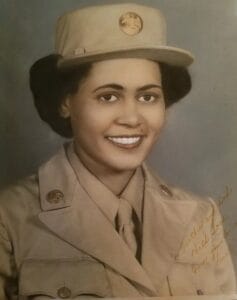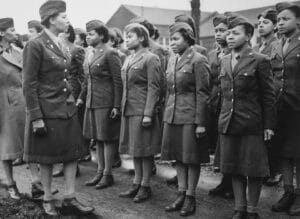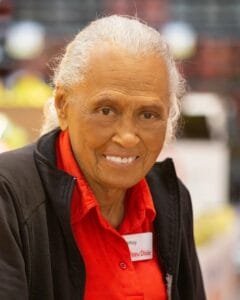Born in King George County, Virginia, Davis was the only girl with five brothers. Her father worked for the U.S. Navy. When it was time for high school, she had to move away: there was no Black high school in King George County, so she went to school at various high schools in New Jersey, New York, and Washington D.C., depending on whether there were family members she could stay with. She graduated from Dunbar High School in Washington D.C., and went to work in that city for the U.S. Bureau of Engraving. Her job: inspect the paper, before and after printing, that was used for currency. As World War II ramped up, all of her brothers joined the military to fight. “When my baby brother left, I thought about it a few days, and I thought about my mom and pop being left by themselves. But I said, ‘They could make it,’ because they were younger and healthy and active, and I was also, and I wanted to be free to take the chance, to get the experience of being in a group and away from home.”

She told her mother what she wanted to do. “She was into whatever was going on. She was a very forward-looking person. Thank goodness for that.” Davis volunteered for the Army on May 18, 1943. “I quit [my job] to go with my boys,” she said — her brothers. She attended basic training at Fort Des Moines, Iowa. When asked what she wanted to do in the Army, she remembered, she said “I don’t want to clerk. I don’t want to cook. I don’t want to clean a house unless I have to. So driving is the only thing left.” She trained as a driver — from Jeeps to 2-1/2-ton trucks — and how to repair them. She was assigned to the motor pool at Camp Breckinridge in Morganfield, Kentucky.
It was fun to drive officers around to meetings, but Davis wanted more and volunteered for overseas duty. She was assigned to 6888th Central Postal Directory Battalion at Fort Oglethorpe, Georgia, for training. The Battalion was almost all-Black, save for a few Latinas. Mail delivery sounds like a boring job, but it was actually critical: a backlog of mail for troops had developed in England: millions of pieces of mail for soldiers. The Battalion adopted the slogan, “No Mail, Low Morale” — those soldiers needed to hear from home. The 6888th left the U.S. on February 3, 1945, sailing on the fast liner Île de France. They were intercepted by German U-Boats and had to take evasive maneuvers, and safely made it to Glasgow, Scotland, on February 12. They transferred to a troop train to Birmingham, England, where they were greeted by 17 million pieces of late mail — with more arriving daily.

The women divided into groups and worked around the clock to clear the backlog. The Battalion was commanded by Maj. Charity Adams Earley — the first Black woman to receive a commission, according to the U.S. Army. “A white general came to review her operation, and he said he was sending a white officer to tell them how to do it right,” said Retired Brig. Gen. Wilma Vaught at a 2009 ceremony to honor the Battalion. “Her response was, ‘Sir, over my dead body, sir!’ The general put her up for court-martial but later dropped it, and they became friends. He later apologized.” The Army asked the women to clear up the mail backlog within six months. “We got the job done in three months,” she said. “We knew how important those letters were for the soldiers. They were homesick and tired, and letters from home would really boost their spirits.” Davis’s job was to drive the truck loaded with mail to distribution points, and remembered sometimes passing dead bodies along the road. When there wasn’t a truckload ready, she helped sort the letters and packages.

“There were a lot of undelivered Christmas packages that had piled up besides the letters,” Davis said. Delivery was complicated by troop movements. “It was a lot of work, but it was efficient and purposeful work,” she said. The Battalion sorted about 195,000 pieces of mail a day, seven days a week. Once the backlog was cleared in England, they were moved to France for the same task there. As the war wound down, the women were returned to the U.S. and the Six-Triple-Eight was disbanded. She used her G.I. Bill benefits to go back to school in New York to learn fashion design, and worked in that industry for 30 years. At 73, to stay active after her husband died, she took up karate. She later switched to taekwondo, and earned a second-degree black belt. At 81, she took a part-time job at a Winn-Dixie grocery store. In 2022, there were only six members of the 6888th’s 855 members still alive; Davis was the oldest. All six received the Congressional Gold Medal in recognition of their services in the United States Army. Davis was asked why she served. She replied, “It’s my country too.” In her honor, Winn-Dixie’s parent company Southeastern Grocers, Inc. created the Romay Davis Belonging, Inclusion and Diversity Grant with the goal of funding minority-supporting organizations. She retired from the company at age 102. Catherine Romay Johnson Davis died in Montgomery, Ala., on June 21. She was 104.
